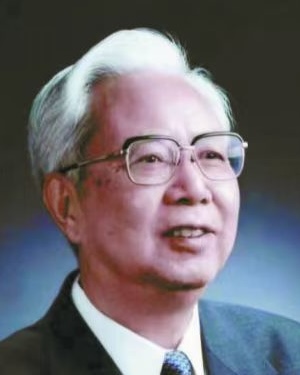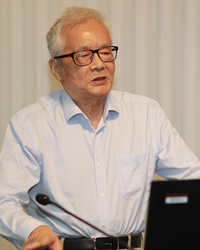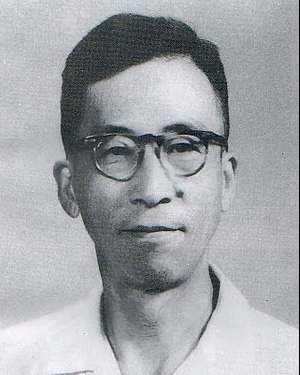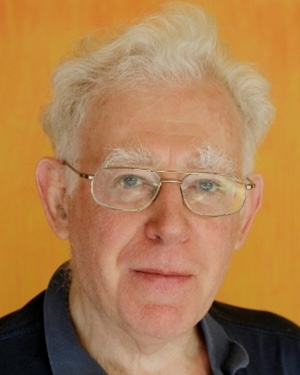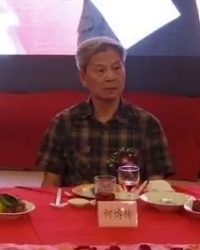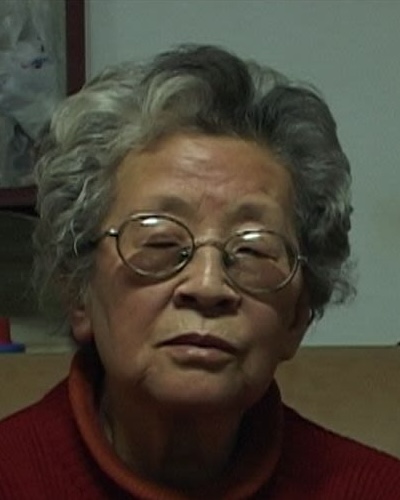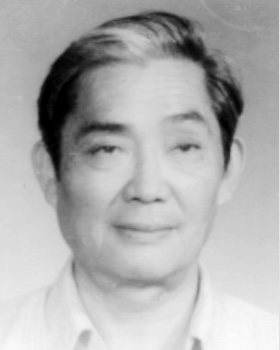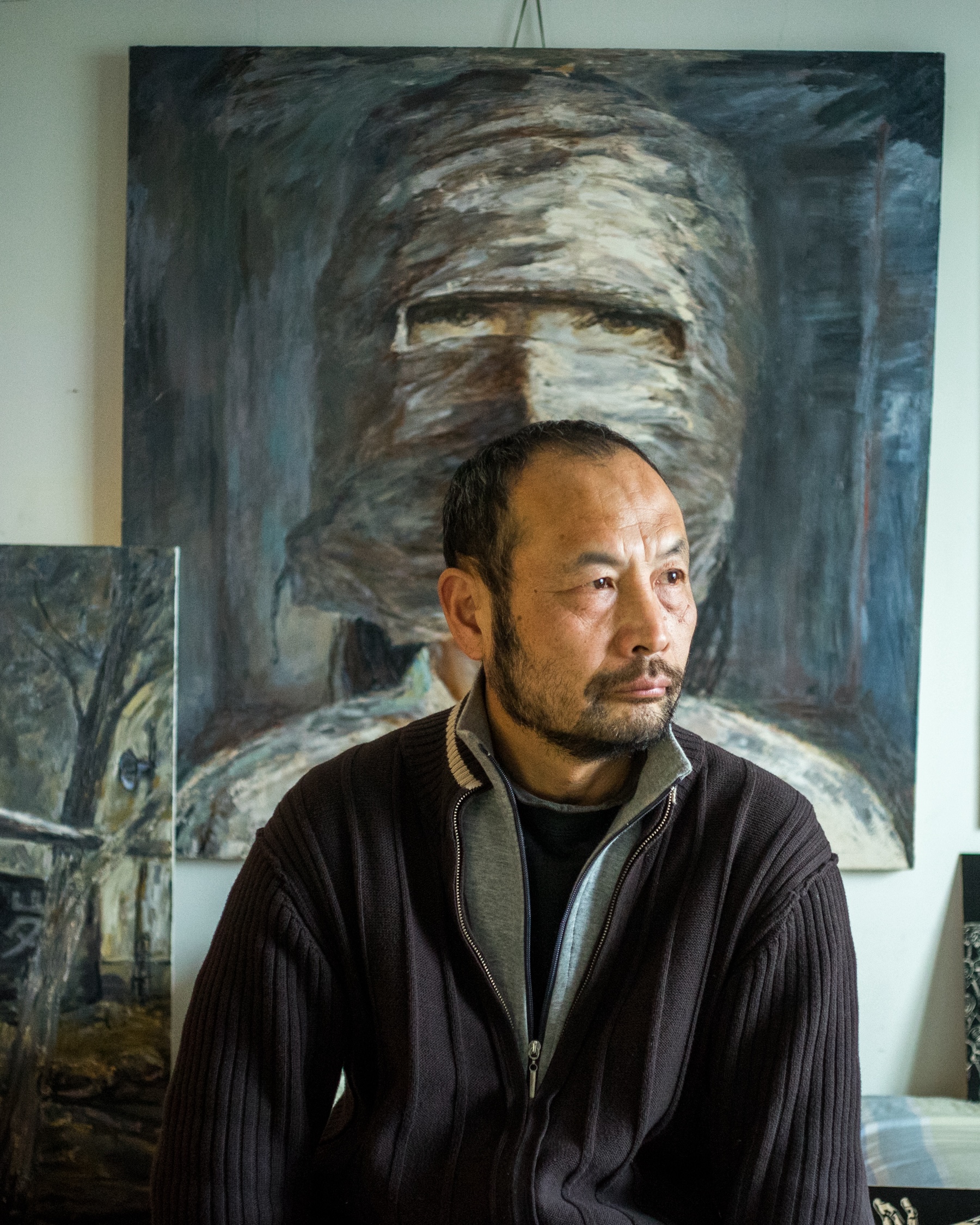Explore the creators
Showing 229 creators in the collection
229 creators
Gu Yan
Gu Yan (b. 1935), a native of Shanghai, was admitted to the Physics Department of Peking University in 1952, and after graduating in 1956, he went to the Physics Department of Lanzhou University for postgraduate studies. In 1957, he was labeled a Rightist, and was exiled to Tianshui, Gansu Province for re-education through labor. During the Great Famine, he and other exiled students decided to publish an underground magazine, which, at his suggestion, was named “Spark.” He wrote the lead article for the first issue of Spark, "Give up Illusions and Prepare for Battle!” This denounced the CCP rule of the time as "national socialism monopolized by oligarchs" and "the same as the Nazi national socialism with nothing in common with true socialism." He was arrested in October 1960 and sentenced to 17 years in prison in 1965 as the principal offender in the "Spark Counter Revolutionary Group Case". In 1974, his sentence was reduced by three years for a technological invention he made in prison, and he was assigned to work at a prison factory. After he was rehabilitated in 1980, he worked as a lecturer at Lanzhou University, and in 1983 he worked as a visiting scholar at Drexel University in Philadelphia, United States. After returning to China in 1984, he was appointed as a visiting researcher at the Institute of Theoretical Physics of the Chinese Academy of Sciences. In 1985, he was appointed professor and doctoral supervisor at Lanzhou University. At the end of 1991, he was transferred to teach at the University of Science and Technology of China, and continued his research in theoretical physics after his retirement in 2000. His achievements in the field of nonlinear physics are widely recognized.
Gu Zhun
Gu Zhun (1915-1974)was 12 when joined the accounting firm of Pan Xulun, the founder of China’s modern accounting. At the age of 15, he became the principal of the firm's correspondence school, and at the age of 18, he completed the book Accounting for Banks, which was the first textbook on bank accounting in China. In 1935, Gu Zhun joined the Communist Party of China; he was concerned about the fate of the country, and actively participated in the resistance to the Japanese aggression. After the war, he served as the director of the Shanghai Municipal Finance Bureau and the Shanghai Municipal Taxation Bureau. During the Three-Antis and Five-Antis Campaign in 1952, he was dismissed from his post because of his dissenting views on the taxation policy of the time. He insisted that taxes should be collected in accordance with the law, and did not agree with the methods based on self-reporting and democratic evaluation (*minzhu pingyi*). In 1956, he joined the Institute of Economics (now belonging to the Chinese Academy of Social Sciences) as a researcher, and became the first person to put forward the theory of China's socialist market economy with his article entitled "*On the Production of Commodities and the Law of Value under the Socialist System*”. Because of his dissatisfaction with the Rectification Movement and the Soviet Union, Gu Zhun was labeled a Rightist and expelled from the Party. He was exiled to work in labor camps in Hebei Province, and later Henan Province and a Beijing suburb, from 1958 to 1960. In 1962, Gu Zhun’s Rightist label was removed and he returned to the Institute of Economics. In September 1965, he was labeled an "Extreme Rightist" and exiled to Zhoukoudian in the suburbs of Beijing because he insisted on his political and economic ideas, including the importance of respecting the law of value. He was the only officially labeled "Second-time Rightist" in China. During the Cultural Revolution, Gu Zhun was repeatedly criticized and punished, and from 1969 to 1972 he was sent to work in the May Seventh Cadre School in Xi County, Henan Province. On December 3, 1974, he died of lung cancer in Beijing.
Gu Zhun always upheld the spirit of independent thinking. He not only made significant contributions to the field of economics in China, but also devoted himself to the study of politics, history and philosophy, translating several foreign classic works on economics and democracy and writing a large number of articles. As he personally experienced the Anti-Rightist Campaign, the Great Famine, and the Cultural Revolution, his diary is also considered a valuable source of information on these historical events. According to Wang Xiaolin's (see separate entry) book, *Gu Zhunun and His Times*, although Gu Zhun was not formally baptized as a Christian, he was exposed to Christianity since his childhood and had a deep understanding of Christianity. As Wang wrote in her preface: "His thoughts and behavior never departed from the pursuit and search for human nature, humanism, the laws of nature, the natural rights, namely the freedom and equal rights that all human beings were born with".
Haliday, Jon
Jon Halliday (June 28,1939—) is an Irish historian specializing in modern Asia. He was educated at University of Oxford and was formerly a senior visiting research fellow at King's College London.
Halliday has written or edited several books, including <i>A Political History of Japanese Capitalism and Korea: The Unknown War</i>. He and his wife, Jung Chang, co-authored a biography of Mao Zedong, <i>Mao: the Unknown Story</i> and <i>Mme Sun Yat-Sen</i>, about the life of Soong Ching-ling, the wife of Sun Yat-sen.
He Bochuan
He Bozhuan , a native of Guangzhou, graduated from the Mathematics Department of Guangdong Normal University in 1962, and participated in the development of China's first generation of computers as a student. He taught in a middle school after the end of the Cultural Revolution, and was later transferred to teach at the Department of Philosophy at Sun Yat-sen University. In 1989, he published <i>China on the Edge: The Crisis of Ecology and Development</i>, a book that describes the crises that China is likely to face in the future. The book was recommended by Sanlian Bookstore in 2005 as one of the books that had the greatest impact on China in the last 20 years.
He Fengming
He Fengming (1932- ), a native of Huining, Gansu Province. After the founding of the PRC in 1949, He gave up the opportunity to go to university and joined <i>Gansu Daily</i>, a CCP newspaper founded in September that year.
In 1957, He and her husband, Wang Jingchao, who was also an editor of <i>Gansu Daily</i>, were labeled Rightists and exiled to work in the Shigong labor camp and Jiabiangou labor camp, respectively. Because of the harsh conditions at the Jiabiangou labor camp, Wang died of starvation in 1961. In the same year, He Fengming returned to work at the <i>Gansu Daily</i> in Lanzhou. During the Cultural Revolution, she was labeled a Rightist again, dismissed from her position, and sent back to her hometown for supervised labor.
After rehabilitation in 1978, He was assigned to teach at the Northwest Institute of Nationalities (now Northwest Minzu University) in 1979 until retirement. In her later years, He wrote and published <i>Experience: My 1957</i>, documenting her experiences in the Anti-Rightist Campaign. Director Wang Bing had made the documentary <i>He Fengming</i> about her, which was more than three hours long and mostly oral narrations of He.
He Jiadong
He Jiadong (September 1932 - October 16, 2006) was a writer and publisher. In 1938 he joined the Nationalist government army to fight for China against Japan. In 1945, he joined the Chinese Communist Party. In 1949, he founded the Workers' Publishing House and served as manager, editor, and reporter for *Workers' Daily*, an official party organ of the Chinese labor movement.
In 1957, He was labeled a Rightist, expelled from the Party, and dismissed from his post because he published Liu Binyan's novel *The Inside Story of Our Newspaper*, which criticized CCP’s press control and was later declared to be anti-party. In 1965, He was exiled to Chenwu County, Shandong Province, where he labored for 14 years. In 1979, he was rehabilitated and became executive vice president and deputy editor-in-chief of the Workers' Publishing House. In 1983, he founded the monthly *Ren Sheng (Life)* magazine; in 1984, he founded and became editor-in-chief of the literary magazine *Kai Tuo (Pioneer)*. He, however, was punished for publishing in the inaugural issue Liu Binyan’s *"A Second Kind of Loyalty"*, a reportage literature work about those who dared to confront the authorities. He resigned and retired in 1985. In the same year, he was invited to serve as president of the China Administrative Management Correspondence University, and in 1987 became an advisor to the Beijing Institute of Social and Economic Sciences. In 1988, the Institute took over the *Economics Weekly* and He served as editor-in-chief. During the 1989 democracy movement, the newspaper reported on the movement and published a number of commentaries. On June 11 of the same year, the newspaper was shut down. He died on October 16, 2006, in Beijing due to illness.
In his later years, He wrote extensively promoting liberal ideas and advocating the introduction of political reforms and the establishment of constitutional democracy in China. However, due to censorship by the authorities, his freedom of publication was severely restricted. He's last wish was to have his collected works printed and given to friends and family, but the printed books were seized by the Chinese authorities, and Ding Dong, the scholar who coordinated the publication of the book, was summoned by the police the day after He's death. *The Collected Works of He Jiadong* was later published in Hong Kong by Fellow Press of America.
He Qinglian
He Qinglian (1956-), a native of Shaoyang, Hunan Province, is a writer and scholar. She was admitted to the Department of History of Hunan Normal University in 1979 and worked at the Hunan College of Finance and Economics after graduation in 1983. In 1985, she was admitted to the Department of Economics of Fudan University and received her master's degree. She taught at Jinan University in Guangzhou and later worked as an editor for the *Shenzhen Legal News*.
In January 1998, she published *The Trap of Modernization: Economic and Social Problems in Contemporary China*, which sold 300,000 copies in two months. She is also the author of *Population: A Hanging Sword Over China*, *The Fog of Censorship: Media Control in China* and *China: Crumbling But Not Collapsing*. Her books have been translated and published in several languages. She was listed as one of the 25 most influential People in 1999 by *Sanlian Lifeweek* magazine, which described her as "representing the conscience of China's reformers".
Due to political pressure at home, she left China for the United States in 2011. During her time in the US, she was a visiting scholar at the University of Chicago, the City University of New York, and Princeton University.
He Shu
He Shu (June 1948-) is a historian of the Cultural Revolution. Born in Chongqing, He Shu graduated from junior high school in 1964 and was unable to enter high school because his father was labeled a Rightist. He was recruited to build roads during the Sichuan Petroleum Battle (a CCP campaign to discover oil fields) in 1965, and then worked in a steel factory in the outskirts of Chongqing in 1972. In 1981, he worked for Chongqing People's Broadcasting Station as an editor of the literature and history program, and then transferred to the Party History Research Office of the CCP Chongqing Municipal Committee in 1989, where he participated in the founding of the Hong Yan Chun Qiu (Annals of the Red Crag) Magazine where he served as deputy editor-in-chief and deputy copy editor. He Shu has been dedicated to research on the Cultural Revolution since his retirement. In 2008, together with Wu Di (Qi Zhi), a professor at the Beijing Film Academy, he founded Remembrance, an electronic periodical for research on the history of the Cultural Revolution; in 2011, He Shu withdrew from Remembrance, and launched Yesterday, an electronic periodical for research on the Cultural Revolution.
He Shu has conducted in-depth research on the history of the Cultural Revolution, especially Chongqing during the Cultural Revolution, and has published several books on Chinese history, especially the history of the Cultural Revolution, as well as more than a hundred articles.
Hong Zhenkuai
Hong Zhenkuai (October 28, 1974-) is a history scholar and columnist who writes for several media outlets, including *The Beijing News*, *Southern Metropolis Daily*, and *Caijing.com*. He was the executive editor of reformist magazine Yanhuang Chunqiu (China Through the Ages), but resigned in 2014 due to dissatisfaction with the authorities’ arbitrary change of the publication’s supervisory unit. His main field of research is economic history, with a special focus on the relationship between finance, taxation and historical/social development. On April 11, 2010, *Southern Metropolis Daily*’s history review section published Hong Zhenkuai's article "L*ove of the country is not the same as love of the king*," which was later taken offline from the newspaper’s website, and the editor of the section was suspended from their position. In 2013, Hong published articles questioning some elements of the story of "Five Warriors of Mount Langyashan," who allegedly jumped off a cliff while fighting the Japanese during World War II rather than surrender. He was then sued by the descendants of the survivors of the five soldiers for reputation damage in 2015, and Hong lost the lawsuit. Hong later also filed reputation damage lawsuits against individuals and organizations that questioned and verbally abused him, and he lost all the cases. In one of the judgments, the court found that the motive of the abusers was to safeguard the image of the martyrs, which was in line with mainstream social values.
Hu Jie
Hu Jie (1958-), Chinese documentary filmmaker. Hu Jie was born and raised in a military family in Jinan, Shandong Province. He joined the military in 1977, graduated from the Shanghai Air Force University of Political Studies in 1986, and went to the People's Liberation Army Academy of Art to study oil painting for two years. In 1992, he was discharged from the military, and briefly worked at the Jiangsu Branch of Xinhua News Agency as a film and television editor. In 1995, he made his first documentary Yuanmingyuan Artist Village, which documented the forced dissolution of the village where he lived in 1993.
In Hu Jie's own view, his works can be divided into three categories: 1) contemporary reality that focuses on ordinary people, such as *Remote Mountain* (about coal miners), *The Female Matchmaker* (about marriage in a remote village), and *Mountain Songs in the Plain* (about abducted women); 2) historical documentation aiming to fill in the blanks of the official narratives about the Anti-Rightist campaign, the Cultural Revolution, and the Great Famine, including *Searching for Lin Zhao's Soul*, *Though I am Gone*, and *Spark*; 3) documentation of citizen activism, in collaboration with feminist scholar and activist Ai Xiaoming (see separate entry), including *The Epic of the Central Plains*, *Garden in Heaven*, and *Care and Love*. Hu Jie has no investors and receives no foreign funding, and he pays for his own filming costs. Due to their political sensitivity, most of his works cannot be publicly screened in China, and are only circulated underground or screened outside the country.
In producing his historical documentaries, Hu Jie hunts down survivors, finds rare written material, unearthing witnesses and documents that tell in excruciating detail how the events unfolded. He is also very much present as a narrator and judge in those films, clearly taking sides with the victims of Maoist China. Almost all of his films come across as radically low-tech — largely because he works alone, but also to give the feeling of authenticity and discovery. (Read more at <https://www.nytimesn7cgmftshazwhfgzm37qxb44r64ytbb2dj3x62d2lljsciiyd.onion/2020/06/28/movies/hu-jie-films.html> and <https://www.nybooks.com/online/2015/05/27/chinas-invisible-history-hu-jie/>).

